This Week in 200 Words
This week, several more states cancelled or postponed their primaries due to the coronavirus, bringing the total postponed state primaries to nine. Georgia will send mail-in ballots to every registered voter in time for its rescheduled primary, Iowa has extended early voting ahead of its primary, and California is working to implement full vote-by-mail before November. Oregon is among several states whose current vote-by-mail system can serve as a model for other states trying to adapt their voting systems.
In national updates, Congress voted Wednesday to pass a massive coronavirus relief bill, which includes $400 million for expanding mail-in voting and other election measures. Democrats in Congress have called for more funding – advocates determined that states need a total of $2 billion – but met Republican opposition. And reports of insider trading on the virus outbreak by members of Congress have intensified calls for anti-corruption measures in Washington.
National News
Chicago Tribune – ‘Big help, quick help, is on the way’: Vote expected this afternoon on largest economic rescue bill in US history
The White House and Senate leaders announced agreement Wednesday on an unparalleled, $2 trillion emergency bill to rush aid to businesses, workers and a health care system slammed by the coronavirus pandemic.
It’s the largest economic rescue bill in history. The package is intended as a weekslong or monthslong patch for an economy spiraling into recession or worse and a nation facing a grim toll from an infection that’s killed nearly 20,000 people worldwide.
Underscoring the effort’s sheer magnitude, the bill finances a response with a price tag that’s half the size of the entire $4 trillion annual federal budget.
[…] “Pelosi was a force behind $400 million in grants to states to expand voting by mail and other steps that Democrats billed as making voting safer but Republican critics said was political opportunism. The package also contains $15.5 billion more for a surge in demand for food stamps.
NBC News – Burr insider trading scandal reveals need for stronger anti-corruption measures
Before the Trump administration finally acknowledged the true threat posed by the coronavirus known as COVID-19 to America’s health and well-being and before the stock market began to crash at the end of February, Sen. Richard Burr, R-N.C., was publicly downplaying the gravity of the threat. “Thankfully, the United States today is better prepared than ever before to face emerging public health threats, like the coronavirus, in large part due to the work of the Senate Health Committee, Congress, and the Trump Administration,” Burr assured Americans in a Fox News op-ed co-authored with Sen. Lamar Alexander, R-Tenn.
But while Burr was telling us not to worry, the powerful chairman of the Senate Intelligence Committee told a very different story to a gathering of dues-paying members of the Tar Heel Circle, a private club of business leaders and organizations. The Tar Heel Circle sponsored a luncheon on Feb. 27 with Burr as its keynote speaker. Unlike in his public appearances, Burr’s message was dire. Fifteen days before the Trump administration restricted European travel, Burr warned the audience against European travel. Sixteen days before North Carolina closed its schools, Burr warned the group closures were likely. Burr said the military might get involved, using military resources for hospitals. Burr reiterated that this was likely going to become a pandemic.
USA Today – Democratic leaders: Act now to protect voting this year amid coronavirus crisis
The world is in crisis. The COVID-19 pandemic has changed everyday life in America and around the globe. It has stripped us of any sense of normalcy and routine. But as we fight this virus with all we have, we cannot let it strip Americans of the one right that protects all others — the right to vote. That’s why it’s critical that our leaders provide clarity, not confusion, when it comes to the ballot box.
Sens. Amy Klobuchar and Ron Wyden have introduced a bill to do just that. Within 30 days of its enactment, the Natural Disaster and Emergency Ballot Act of 2020 would require states to put together a contingency plan for eligible voters to cast their ballots during states of emergency, such as the COVID-19 pandemic. This would not only help us avoid the prospect of delaying elections, but also ensure that Americans don’t lose their chance to make their voices heard.
Protect health, safety and voting
No one should have to put their health and safety at risk in order to exercise their constitutional rights at the ballot box. States should automatically mail ballots to registered voters; voters should be able to mail back those ballots for free or with prepaid postage by the date of the primary; voters should also be able to drop off ballots at predesignated locations, as is the case in Arizona, or have someone else drop it off for them; and ballots should be accepted as long as they are postmarked by Election Day and received within 10 days of the election.
The Hill – Nationwide changes needed to make election coronavirus-ready could cost $2 billion: study
Costs for the federal government to make it safe for voters to participate in the general election could add up to $2 billion, should the coronavirus still be a concern in November, a new study by an independent think tank shows.
The study, which was conducted by the Brennan Center for Justice, outlines several sweeping nationwide changes to the current voting system such as universal mail-in voting, easier online voter registration and more.
According to study, the process of mailing and receiving ballots would cost between $413 million and $593 million alone. For example, costs would be incurred in many states from ballot box construction — a place where voters could go and drop off their mail-in ballots. At least four states — California, Colorado, Oregon and Washington — already have drop-off ballot boxes.
Another big chunk of the cost — approximately $270 million — would go to maintaining and bolstering in-person polling places.
“Regardless of Covid-19, people without Internet and mail access, those who need language assistance to vote, and people with disabilities who rely on voting machines to cast a private and independent ballot may be disenfranchised if polling places are closed,” the think tank said in its report.
State Updates
Georgia – Atlanta Journal Constitution – Georgia to mail absentee ballot request forms to all active voters
All of Georgia’s 6.9 million active voters will be mailed absentee ballot request forms for the May 19 primary, a major push to encourage voting by mail during the coronavirus pandemic, Secretary of State Brad Raffensperger announced Tuesday.
The absentee voting effort will allow Georgians to decide on their choices for president and other elected offices from home, without having to visit in-person voting locations where the coronavirus could more easily spread. Early voting and Election Day precincts will remain open. A large number of people voting by mail would be a significant change in the way elections are run in Georgia. While the state has allowed any voter to cast a ballot by mail since 2005, just 7% of voters did so in the 2018 election for governor.
Oregon – Oregon Public Broadcasting – Oregon’s Mail Voting System Gains New Cachet Amid Coronavirus
Oregon elections officials say they’re confident about proceeding with the state’s scheduled May 19 primary – but they say it would be very different if they were talking about bringing hordes of would-be voters to thousands of polling stations amid the coronavirus epidemic.
“It would be really difficult,” said Multnomah County elections director Tim Scott. “I feel for the states that still do most of their voting on election day.”
Seven states and Puerto Rico have already postponed their primary elections, and more delays may be in the works. And if the epidemic continues next fall, it could also jeopardize the ability of voters in many states to participate in the November presidential election.
As a result, the mail voting system pioneered by Oregon and also used in Washington state is now getting new support nationally. Several voting rights groups are pushing for a major expansion of mail balloting. And U.S. Sen. Ron Wyden, D-Oregon, is partnering with Sen. Amy Klobuchar, D-Minnesota, on a bill to require every state to provide the option of a mail ballot in the November election.
Iowa – Des Moines Register – Iowa secretary of state extends absentee voting period for June primary due to coronavirus
Iowa Secretary of State Paul Pate is extending the June primary’s absentee voting period for mailed ballots to 40 days in light of the COVID-19 outbreak.
Pate is also encouraging more Iowans to cast ballots by mail. But, he said in a news release on Monday, the polls will remain open in Iowa on June 2. The directive, which Pate signed Monday, means Iowans will be able to cast mailed ballots beginning on April 23.
“The safety of voters takes precedence, and by encouraging Iowans to vote absentee, we can reduce the risk of community spread of COVID-19,” Pate said. “We still plan on having polls open on June 2 for voters who prefer to cast ballots in-person, but this effort will help reduce the risk of infecting others.”
Pate, a Republican, said curbside voting continues to be available to Iowans with disabilities and anyone who might have difficulty entering a polling place. The option will be extended to those who are in the high-risk population for the coronavirus as defined by the Centers for Disease Control and Prevention, he said. The CDC says “older adults and people of any age who have serious underlying medical conditions might be at higher risk for severe illness from COVID-19.”
Connecticut – The Hill – Connecticut delays Democratic primary over coronavirus outbreak
Connecticut Gov. Ned Lamont (D) announced Thursday he is moving his state’s primary to June 2 amid concerns over the coronavirus.
Lamont said the primary, originally scheduled for April 28, was moved to make public health a “top priority” during the outbreak.
“In coordination with other states and our Secretary of the State, and in an effort to carry out Democracy while keeping public health a top priority, I have decided to move our presidential primary to June 2nd. I will provide more information later today,” he tweeted.
Connecticut’s primary will award 60 pledged delegates.
The Connecticut Democratic Party praised the move, citing “overwhelming uncertainty” over the pandemic.
“We are in uncharted territory, with so many election deadlines coming up,” said Connecticut Democratic Party Chairwoman Nancy Wyman. “It is important that we protect the health of voters and make sure that every voter feels safe going to the polls. We can do that far better with postponement.”
The Constitution State joins a list of other states that have delayed their nominating contests. Georgia, Kentucky, Louisiana, Maryland, Ohio and Wyoming have all postponed their primaries or caucuses to grapple with the coronavirus as government officials stress “social distancing” and avoiding groups of more than 10 people.

